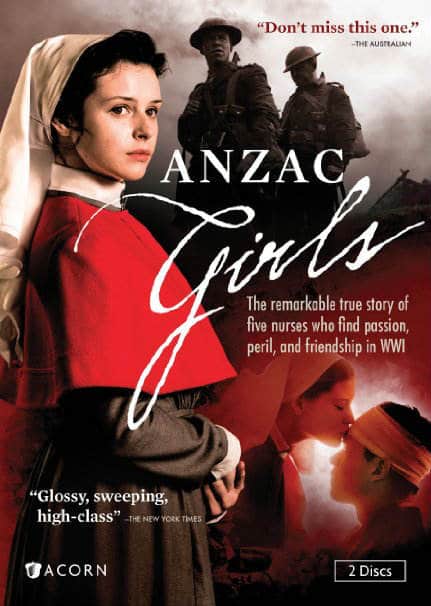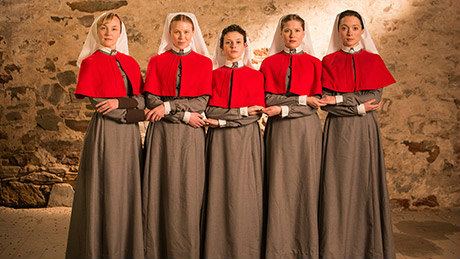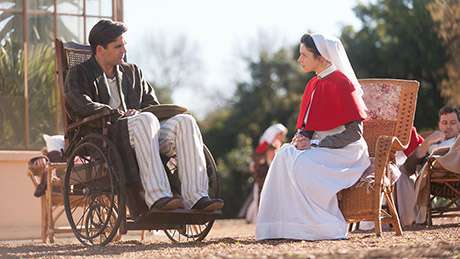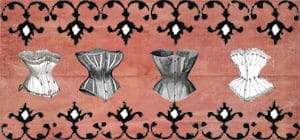I ran across this miniseries quite by chance and was immediately curious. For a start, it’s set in New Zealand, which isn’t a typical setting I ordinarily see a lot of productions take place in. Inspired by real events, the story follows a group of qualified, bright-eyed nurses who believe they are about to embark on an adventure of a lifetime, little realizing the horrors that await them.
Among them, there is the beautiful Alice King-Ross (Georgia Flood), who attracts the attentions of many patients and soldiers alike. But she only has eyes for one Lt. Harry Moffitt (Dustin Clare). Her impulsive pursuit of him is cautioned by the kindly older doctor (Charles Mayer), who, while working closely with her begins to care for her. Elsie Cook (Laura Brent) is hiding her secret from everyone, worried that if discovered she’d be thrown out of her work as a nurse.
Finally, there is Olive Haynes (Ann McGahan), a cheerful vicar’s daughter who believes anyone bothering with romance at a time such is this is frivolous. She’s completely devoted to caring for her patients without complicating her life by emotionally opening her heart to any man. This is why she’s so opposed to the possibility of a suit when she meets Pat Dooley (Brandon McClelland). For now, he’s not among the ranks of soldiers at the front, which keeps him frequently at the same posting as Olive. But every moment is precious and every posting temporary. Changes soon enter all of these women’s lives.
As good as this miniseries is, however, I couldn’t like it as well as some of the other period dramas of this era. Since finishing Anzac Girls, I also saw PBS’ The Crimson Field and if I’m being honest, easily liked the PBS adaptation more. That being said, unlike the recent British production, what this series does have going for it is truth based in actual facts. In other words, Anzac Girls bases its stories on real women who worked in these fields during WWI, whereas its competitor based its scripts more in the idea of history. The drama does move slowly, as a result, but countering this is the ability fans might have to relate more to Anzac Girls simply because you do come to care deeply for these characters. Knowing they are real historical figures only helps this. You cry tears when they’re suffering, shout for joy when they’re happy, all of which is brought full circle when the ending lets us know what happened to these women post war.
Speaking more of specifics, I liked Olive’s story perhaps best. Her transformation was a bit “abrupt,” but I think she experienced enough to see what living in the moment could mean, and it genuinely changed her. In this case, it was all for the better. Her stories’ end was most fulfilling because we saw it from beginning (from her arrival at the battlefield) to the end.
Beyond that, I liked everyone. Despite her being the most featured character, I wasn’t as fond of Alice (as a character). She started out fine but grew tiresome as the series wore on. Her emotional journey does have merit and the actress does a stupendous job emotionally expressing that. Fortunately, everyone else around her is fantastic. The actresses and characters, alike, were wonderful. There is also Grace Wilson (Caroline Craig), whose personal story is a bittersweet one, especially knowing her character’s professionalism as a nurse. Elsie is a great character whose private life I desperately rooted to see end happily though I feel like Hilda Steele (Antonia Prebble) was cheated as a character. She didn’t get the same time or attention as her fellow characters.
Flubs and annoyances aside, Anzac Girls is a powerful piece of television that’s rooted in reality. I liked the poignant way these characters lives are brought alive and what’s more, I like that this is more miniseries than a year’s long span for a TV serial. This way, there is closure and as weird as this may sound, I think the emotional impact is greater for it. There’s resolution (primarily through voiceover rather than visually seeing what comes next) for the characters. Whether or not we like the ending is another matter entirely, but it’s there, and I liked that.
Separation, death and illness, near-death experiences and heartbreak are what this series nurtures, all set against events like Gallipoli and in service at the Western Front. There are moments of despair and edge-of-your-seat suspense simply because we worry for someone’s safety (and it’s not always the men in these predicaments), before a beautiful, real and honest moment follows, helping to wipe away the heartache. The struggles are beyond anything we can imagine and the stories inspire a new appreciation for the tasks these women went through. These women (the men too), and their stories are relevant today and are a constant reminder of everything we have to be grateful for.
If you like British dramas similar to this, Anzac Girls is worth a viewing. It’s poignant with beautiful performances and is set against a gorgeous place, even amidst the desolation.
Anzac Girls is available on region one and U.K. DVD, and can be found on Amazon’s Instant Video streaming service. You can also (currently) find the entire series on Acorn TV’s streaming service.
Photos: ABC (Australian Broadcasting Company) / Acorn TV
Overall Rating
“Hello, Gorgeous.”
Romance Rating
“In vain have I struggled. It will not do. My
feelings will not be repressed. You must allow me
to tell you how ardently I admire and love you.”
RELATED:
Browse our Period Drama archives or find more Television reviews.
ARE YOU A ROMANCE FAN? FOLLOW THE SILVER PETTICOAT REVIEW:
 Our romance-themed entertainment site is on a mission to help you find the best period dramas, romance movies, TV shows, and books. Other topics include Jane Austen, Classic Hollywood, TV Couples, Fairy Tales, Romantic Living, Romanticism, and more. We’re damsels not in distress fighting for the all-new optimistic Romantic Revolution. Join us and subscribe. For more information, see our About, Old-Fashioned Romance 101, Modern Romanticism 101, and Romantic Living 101.
Our romance-themed entertainment site is on a mission to help you find the best period dramas, romance movies, TV shows, and books. Other topics include Jane Austen, Classic Hollywood, TV Couples, Fairy Tales, Romantic Living, Romanticism, and more. We’re damsels not in distress fighting for the all-new optimistic Romantic Revolution. Join us and subscribe. For more information, see our About, Old-Fashioned Romance 101, Modern Romanticism 101, and Romantic Living 101.






Anzac Girls and mercy Street were on the the same time in my area. Watching them both, I was struck by how little had changed in the fifty years between the two wars: the doctors were still contemptuous of the nurses, saying there was nothing they could do that an orderly couldn’t; there was still a criminal lack of everything necessary to treat the wounded ( the Anzacs had to rip up their petticoats to make bandages) etc.
Hi, Sandra! Both “Mercy Street” and “Anzac Girls” are very good. I admire their storytelling, and am sad the latter didn’t get more time to grown and expand on its wonderful characters. It is sad to see that there was still (despite the many years between!) medical care that went unattended due to supplies or lack of personal. But it’s nice to see these spunky Anzac girls do everything – even if they did have to get creative to help, they could to ease the suffering and save the lives of the soldiers.